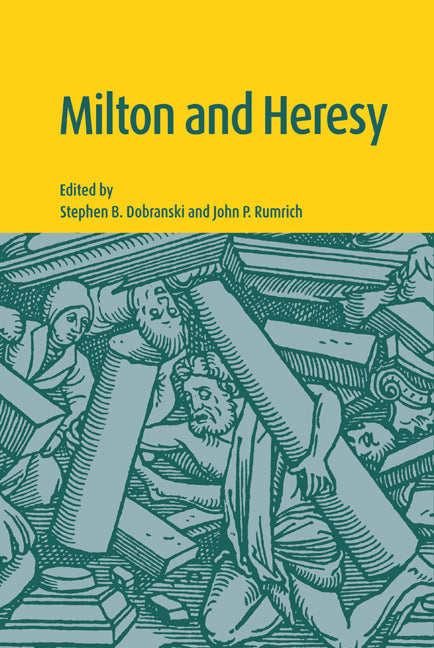Freshly Printed - allow 6 days lead
Couldn't load pickup availability
Milton and Heresy
Twelve essays examine Milton's heretical opinions and dissent from orthodoxies of modern Milton criticism.
Stephen B. Dobranski (Edited by), John P. Rumrich (Edited by)
9780521630658, Cambridge University Press
Hardback, published 10 September 1998
284 pages
23.7 x 16.1 x 2.2 cm, 0.53 kg
"...splendid..." Larry R. Isitt, Church History
It is distinctly paradoxical that John Milton - who opposed infant baptism, supported regicide, defended divorce and approved of polygamy - should be heard as a voice of orthodoxy. Yet modern scholarship has often understated or explained away his heretical opinions. This volume investigates aspects of Milton's works inconsistent with conventional beliefs, whether in terms of seventeenth-century theology or the common assumptions of Milton scholars. Contributors situate Milton and his writings within his specific historical circumstances, paying special attention to Milton's pragmatic position within seventeenth-century religious controversy. The volume's four sections deal with heretical theology, heresy's consequences, heresy and community, and readers of heresy; their common premise is that Milton, as poet, thinker and public servant, eschewed set beliefs and regarded indeterminacy and uncertainty as fundamental to human existence.
Introduction Stephen B. Dobranski and John P. Rumrich
Part I. Heretical Theology: 1. Milton on heresy Janet Mueller
2. Milton's antiprelatical tracts and the marginality of doctrine Thomas N. Corns
3. How radical was the young Milton? Barbara K. Lewalski
Part II: Heresy and Consequences: 4. Milton's arianism: why it matters John P. Rumrich
5. 'Elect about the Rest': theology as self-representation in Milton Stephen M. Fallon
6. Milton's kisses William Kerrigan
Part III. Heresy and Community: 7. Licensing Milton's heresy Stephen B. Dobranski
8. Milton and the rationale of insulting John K. Hale
9. Treason against God and state: blasphemy in Milton's culture and Paradise Lost David Loewenstein
10. The politics of performance in the inner theatre: Samson Agonistes as closet drama Elizabeth Sauer
Part IV. Readers of Heresy: 11. Asserting eternal providence: Milton through the window of liberation theology Joan S. Bennett
12. Milton's transgressive manoeuvres: receptions (then and now) and the sexual politics of Paradise Lost Joseph A. Wittreich.
Subject Areas: Literary studies: c 1500 to c 1800 [DSBD]


